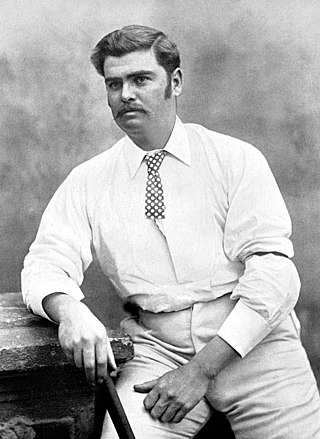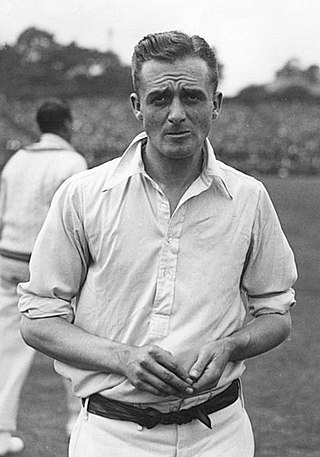Related Research Articles
The Ashes series, similar to the cricket series of the same name, was a best-of-three series of test matches between Australia and Great Britain national rugby league football teams. It had been contested 39 times from 1908 until 2003 largely with hosting rights alternating between the two countries. Since 1973, Australia has won a record thirteen consecutive Ashes series.

The Australian national rugby league team, the Kangaroos, have represented Australia in senior men's rugby league football competitions since the establishment of the game in Australia in 1908. Administered by the Australian Rugby League Commission, the Kangaroos are ranked first in the IRL Men's World Rankings. The team is the most successful in Rugby League World Cup history, having won the competition 12 times, and contested 15 of the 16 finals, only failing to reach the final in the 1954 inaugural tournament. Only five nations have beaten Australia in test matches, and Australia has an overall win percentage of 69%.
The York Wasps was an English professional rugby league club based in York. At the start of the 2002 season, the club was dissolved. A new club, York City Knights was established to take the Wasps' place for the 2003 season.
Millward is a surname meaning someone in charge of a mill.

Arthur Shrewsbury was an English cricketer and rugby football administrator. He was widely rated as competing with W. G. Grace for the accolade of best batsman of the 1880s; Grace himself, when asked whom he would most like in his side, replied simply, "Give me Arthur". An opening batsman, Shrewsbury played his cricket for Nottinghamshire County Cricket Club and played 23 Test matches for England, captaining them in 7 games, with a record of won 5, lost 2. He was the last professional to be England captain until Len Hutton was chosen in 1952. He was a Wisden Cricketer of the Year in 1890. He also organised the first British Isles rugby tour to Australasia in 1888.

Arthur Edward Robert Gilligan was an English first-class cricketer who captained the England cricket team nine times in 1924 and 1925, winning four Test matches, losing four and drawing one. In first-class cricket, he played as an amateur, mainly for Cambridge University and Sussex, and captained the latter team between 1922 and 1929. A fast bowler and hard-hitting lower order batsman, Gilligan completed the double in 1923 and was one of Wisden's Cricketers of the Year for 1924. When his playing career ended, he held several important positions in cricket, including that of England selector and president of the Marylebone Cricket Club (MCC). A popular figure within cricket, he was widely regarded as sporting and friendly.

Charles Thomas Biass Turner was a bowler who is regarded as one of the finest ever produced by Australia. Among his accomplishments were:

Percy Stanislaus McDonnell was an Australian cricketer who captained the Australian Test team in six matches, including the tour of England in 1888.

Arthur Harwood "Affie" Jarvis was an Australian wicket-keeper who played for Australia and South Australia. His Test cricket debut was against England at the MCG on 15 January 1885 and his last Test was also against England at the same ground on 1 March 1895.
Morappakam Josyam Gopalan was an Indian sportsman who represented India in cricket and hockey.
Alfred Percy Williams was an Australian cricket Test match umpire.
Gregory Stuart Pierce was an Australian rugby league player, coach and administrator. He played as a lock for the Cronulla-Sutherland Sharks in the National Rugby League competition and for Australia. He captained his country on one occasion.

Arthur George Jenkins was a South Australian cricket Test match umpire.

George Gibson Macaulay was a professional English cricketer who played first-class cricket for Yorkshire County Cricket Club between 1920 and 1935. He played in eight Test matches for England from 1923 to 1933, achieving the rare feat of taking a wicket with his first ball in Test cricket. One of the five Wisden Cricketers of the Year in 1924, he took 1,838 first-class wickets at an average of 17.64 including four hat-tricks.
Martin Hodgson was an English rugby league footballer who played in the 1920s, 1930s and 1940s. Lauded as one of the game's greatest ever second-rows, he represented Great Britain, England and Cumberland on many occasions. Hodgson played his entire club career with Swinton with whom he won two Championships. He toured Australasia in 1932 and 1936 with the Great Britain lions, and became the only British forward to appear in five Ashes-winning squads, between 1929 and 1937.
This article describes the history of cricket in British India from the 1918–19 season until the end of the Second World War in 1945.
Roger Millward was an English rugby league footballer who played in the 1960s and 1970s, and coached in the 1980s and 1990s. A goal-kicking stand-off, he gained a high level of prominence in the sport in England by playing for Hull Kingston Rovers (captain) and Castleford, as well as representing Great Britain. Millward was awarded the Order of the British Empire (MBE) in 1983. Nicknamed “Roger the Dodger” for his elusive running, he was inducted into the Rugby League Hall of Fame in 2000. Millward’s ability placed him in the top bracket of rugby league halves to have ever played the game.
Arthur Fitzgerald Folwell was a British-born Australian professional rugby league footballer who played in the 1920s, 1930s and 1940s, coached in the 1940s, and was an administrator in the mid-20th century. An Australia national and New South Wales state representative hooker, he played his club football in the New South Wales Rugby Football League for Sydney's Newtown before becoming their coach and taking them to the 1943 NSWRFL premiership.
A cricket team from England organised by the Marylebone Cricket Club (MCC) toured India from 15 December 1933 to 4 March 1934. In the Test matches, the side was known as "England"; in other matches, it was known as "MCC". England won the Test series 2–0. The MCC team concluded its tour with four matches in Ceylon, two of them first-class.